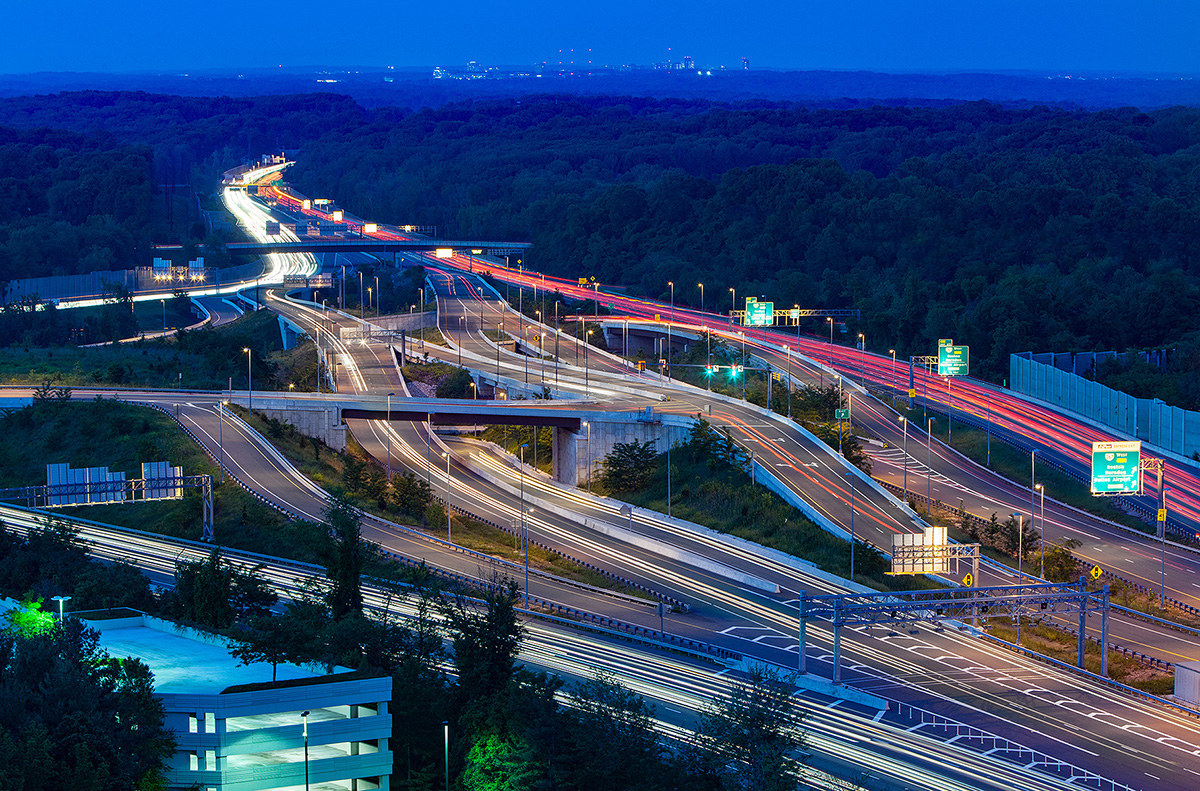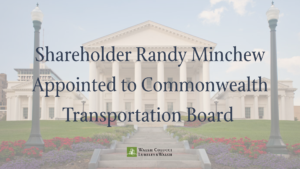
Even prior to the passage of the $1.2 trillion Infrastructure Investment and Jobs Act by Congress, Virginia state agencies and localities were in the midst of major transportation investments throughout the state. With more funds available for transportation projects, Virginia should continue to see improvements to the backbone of the physical economy—roads, rail, public transportation, and shipping.
Highway Projects Underway
495 Express Lanes Northern Extension
VDOT and I-495 toll operator, Transurban, have selected a design-build contractor to construct the final segment of dynamic pricing toll lanes on Virginia’s section of the Capital Beltway. The Lane Construction Corporation will manage the construction of 2.5 miles of additional 495 Express Lanes, which will allow them to ultimately connect to toll lanes planned for the American Legion Bridge, I-270 and I-495 in Maryland. Initial construction activities will begin very soon, and right-of-way acquisition will likely begin in the summer of 2022. The new Express Lanes will open in 2025.
American Legion Bridge Expansion and I-270/495 Maryland Express Lanes
Maryland Department of Transportation (MDOT) has finally confirmed its commitment to relieve one of the worst traffic bottlenecks in the region by partnering with Virginia, the Federal Highway Administration (FHWA), and a private toll operator to expand the American Legion Bridge. They also plan to add managed toll lanes to I-270 and I-495. The project is referred to as OP Lanes™ Maryland, and will ultimately bring managed toll lanes to all of I-495 in Maryland.
MDOT and FHWA have prepared a Supplemental Draft Environmental Impact Statement for the project, and they are in the initial phases of procuring a private partner for the construction and operation of the toll lanes.
Public Transportation Projects Underway
Richmond Highway BRT
Fairfax County, VDOT, and the Virginia Department of Rail and Public Transportation (DRPT) have partnered to bring bus rapid transit (BRT) from Huntington Metro to Fort Belvoir, with the possibility of extending the BRT system into Woodbridge. The design of the BRT system in Fairfax County is nearly complete. The improvements include adding two-way bus lanes in the middle of Richmond Highway, providing three travel lanes and additional turn lanes for cars, and a ten-foot multi-use path on each side of the road.
VDOT has initiated the right-of-way acquisition process for the three miles of the project it is managing from Jeff Todd Way to Sherwood Hall Lane. Fairfax County anticipates having 60% engineered drawings complete in the Spring of 2022 for the portion of the project it is managing—from Sherwood Hall Lane to the Huntington Metro Station. Roadwork is anticipated to begin in 2023, with the BRT system online by 2030.
The project will transform the Richmond Highway corridor, from both a transportation and land use perspective. Fairfax County has updated its Comprehensive Plan through its Embark Richmond Highway study, seeking to capitalize on the new transportation infrastructure by planning for denser development around the nine BRT stations.
Silver Line Phase 2
With Metropolitan Washington Airports Authority (MWAA) officials recently announcing substantial completion of Phase 2 of the Silver Line, and the Silver Line Rail Yard, the process of turning over operations, and maintenance of these facilities to WMATA (aka Metro) is underway. Phase 2 of the Silver Line is currently scheduled to open to riders in May of 2022.
Potomac Yard Metro Station
Construction is well underway for the Potomac Yard Metro Station adjacent to the new Virginia Tech Innovation Campus. However, the opening of the station, originally planned for April of 2022, has been delayed until September of 2022 due to a design flaw in a critical safety system. When the station opens, it will fill what was once the largest gap between Metro stations in the system.
There’s Always More!
There is no longer a lack of transportation funding holding back good projects from moving forward. Before committing to funding projects, it is incumbent on governmental agencies and funding bodies to carefully scrutinize transportation projects to ensure that they serve the needs of the community, solve real problems, and move more people through an interconnected transportation system more efficiently.
The Northern Virginia Transportation Authority (NVTA) is an example of a careful steward of public funds. NVTA is responsible for funding transportation projects through its Six Year Program. The 2018-2023 Six Year Program totaled $1.285 billion. NVTA is currently evaluating project applications for the FY2022-2027 Six Year Program, and it will make final funding decisions in July of 2022. Project applications are evaluated by NVTA staff and consultants, in part, to determine which projects provide the most congestion relief relative to cost.
Similarly, VDOT administers a large portion of its funds for primary and secondary highway projects through its Smart Scale program, which evaluates projects based on factors related to congestion relief, safety, accessibility, environment economic development, and land use. Pre-applications from localities and other entities for FY2023 are due on April 1, 2022.
With all of these transportation projects planned or underway, inevitably right-of-way will be needed from property owners. If you need assistance understanding the impact of a transportation project on your property, please contact Michael Coughlin at 703-680-4664.
Image Source: Express Lanes






